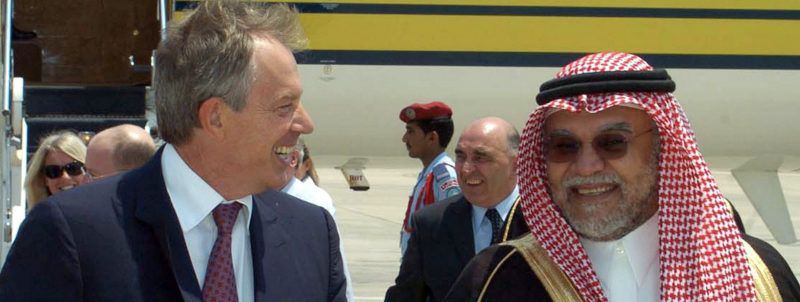The betrayal of liberty
.
The Betrayal of Liberty


BRUSSELS – In the summer of 1989, the world was witnessing a crisis of authoritarianism. While the Soviet Union had started to crumble, tens of thousands of Chinese students erected their statue of cardboard and paper of the goddess of democracy on the Tiananmen Square, and Turkey readied for the end of almost a decade of military rule. Even if democratic countries had their own problems, the limitations of the authoritarian alternative became manifest. The Western world had thus an opportunity to advance human rights, democracy, free markets, and international cooperation. But it was exactly the opposite that happened. Now thirty years later, we find Western democracy in crisis. How did that happen and what can be done?
What explains the advance of authoritarianism in the first place, is that the West became its foremost sponsor. The initial objective in the nineties was that economic cooperation would help countries democratize. But as economic cooperation was advanced, the West shrank back from the idea to make it conditional on reform: the opening up of markets, the improvement of human rights, and steps towards democratization. While billions of dollars of investment and trade money flowed to authoritarian countries and while Western companies were coaxed to share their technology with state-owned enterprises of China, no significant progress was made in terms of political reform.
The West was not blind to that imbalance. “I hate our China policy,” President Bill Clinton said. Intelligence services reported about how China used its prosperity not as an opportunity to open up, but to strengthen the position of the Party, to crackdown on dissidents, and to launch a military pushback against the United States and Japan. The same happened with Saudi Arabia and other Gulf States. The autocracies earned billions from oil exports. Part of that wealth was seen used to finance the propagation of radical Islam. Short-termism ruled in the West. Imports of cheap energy and consumer goods helped preserve a sense of prosperity. Dictators were preferred to the complexity and turbulence of democratic transition. Pragmatism became a cover-up for opportunism.
By the turn of the century, it had become manifest that the advance of liberty had been thwarted in key countries. If China had joined the World Trade Organization, the lowering of import barriers was compensated by other forms of protection. Russia was nominally a democracy, but the newly elected Vladimir Putin became critical of liberalization and called the fall of the Soviet Union a tragedy. Thanks to his gas exports, he could afford it. China, Russia, Turkey, Saudi Arabia: they all became more globalized but hardly democratized. Meanwhile, the share of authoritarian countries in Western imports grew continuously, from around 16 per cent in the nineties to around 32 per cent in the last few years.
Distorting markets
While it surrendered to state capitalism, the West became less a free market itself. Take some of the key conditions of a free market. The limitation of government intervention, for example. What incentive did companies have to roll out a fourth industrial revolution in the West, when the West was glutted with products that were not only kept cheap because of lower wages elsewhere but also by deliberate dumping policy? What has been the effect on markets of Chinese policy of hoarding of the dollars and euros earned from trade and passing them on to state companies to buy ports, technology, and so forth? Along the way, the rich adopted the mentality of serfs.
A free market also entails the limitation of externalities, like environmental costs. But in this case authoritarian countries, with the support of Western energy companies, made sure that raw materials were expensive enough to grow powerful yet cheap enough to keep consumers addicted to them and to slow the search for alternatives. What encouragements did companies have to spearhead environmentally sustainable growth when they could just relocate polluting industries abroad, benefit from governments that turned a blind eye to pollution, and governments that deliberately replaced subsistence farmers to grow the cheap cotton and other agricultural goods that Western consumers throw away so easily? Sure, there has been progress in terms of environmental standards, but how much more progress would there have been and how much more would companies have been simulated to innovate, if we would have applied our internal standards social and environmental also to what we import?
A true free market requires transparency. The very notion of a free market sprang from Western Enlightenment that was all about empowering people to make rational choices. But how can one expect consumers to make rational choices when production chains have become long and complex, when the story behind a product is opaque? It is hard to determine the self-interest, as Adam Smith insisted, if your market is a smoke screen. A free market is about the liberty to make choices as a consumer, but also about the emancipation of people, about allowing them to choose, to understand what the effect of a purchase is on their life, on society. Western schools have educated reasonably good producers, but carless, if not reckless, consumers.
Globalisation
Critics might retort at this point that the West must not pretend to be a saint. The free market in the West remains an ideal rather than a reality. We too have a history of distorting markets. In ancient times, Solon, the cunning statesman of Athens, lured the best pottery producers away from next door Corinth. Alexander Hamilton and Friedrich List helped the United States and Germany nurture infant industries in the nineteenth century. We too had a take-off marked by nationalism. Yet, still, the matter is not so much who and what we were in the past, but what we seek to be in the future. This is not a time for atavism, for letting Western companies be constrained by others who follow our policies from the past.
There is also the idea that we risk global instability and fragmentation if we consistently apply liberal principles to our foreign and trade policy. That is perhaps so. But democratization has always been a turbulent process. Moreover, if the West does not elevate the economic playing field, create a market place that rewards positive entrepreneurship, grows jobs or wealth to redistribute in other ways, the question will rather be that the West itself that might succumb to social turmoil and political fragmentation. In any case, it is better to preserve your own power so as to set your principles than allowing authoritarian countries to undermine them.
But how will poor countries make a living if globalization frays? First of all, we have to ask ourselves whether it was really globalization that made a difference or the ability of states to manipulate globalization. Think of the difference between China and India. However difficult the investment climate in India was, the West choose sides with a dictatorship, with the main difference being that its restrictions were somewhat subtler. Was it also really economic openness that helped combat famine and disease, or the availability of cheap pharmaceuticals that were largely the fruit of previous scientific and industrial advancement in the West?
It is also cynical, especially for the people who try to be optimistic about progress, that nations first have to serve as slaves before they can earn some dignity. If we grow our society stronger, if we regain confidence about leading the next revolution towards a sustainable and humane economy, we might treat the poor more as citizens and as human beings. We might spread some of the founding values enshrined in the American Constitution, the North Atlantic Treaty or the Maastricht Treaty, through serious investment in education, by buying sane, quality products instead of the slave-made polluting junk. We would emancipate other countries, yet not at the detriment of our power and principles.
The empty fortress
Today, at last, the West has grown worried about the rise of authoritarian countries like China and Russia, the spreading of radical ideas by autocrats from the Gulf. After Russia, NATO is shifting its focus to China. Such military response was overdue, but it will remain difficult to militarily balance the authoritarian powers if we still make them affluent. It will also be impossible to halt their propaganda and information wars as long as many of our leaders only pay lip service to Atlantic core values, as long as business people chase short-term profits at the expense of their society, and as long as students no longer know about what it means to live under a dictatorship and what price we payed to reclaim liberty. You cannot build a strong defence around a society that does not know what it defends.
While we leisurely consume the peace that was painfully achieved after World War II, not to asked questions about values, focussed on what we have and not who we are, people also got a feeling of loneliness and being adrift. This is what Francis Fukuyama warned for in his End of History thirty years ago. This is also what former American Secretary of Defence James Mattis pointed at. What slipped away, he said, was not only the power of the West, but also the appreciation and respect for what it once stood for. The ideals of civicism, humanity, and dignity. Again, reality was far from ideal, but as long as ideals are widely appreciated, one still stands a chance of making reality better.
The main fight for the West, will be a fight for the emancipation of the mind, economically the main resource for progress, politically indispensable for preserving democracy, culturally a precondition to preserve the West as one of the cradles of civilization. It will be a fight against this growing tendency towards “peristentialism”, this habit of identifying who we are with what we have, of adjusting your inner world of aspirations to the material progress, the branding, and the indoctrination on the outside. This harkens back to the humanist thinking that was at the origins of the Enlightenment and also inspired America’s Founding Fathers. But it also matters for the more sober-minded calculation of political realism that the capability to grow material power depends on non-material assets, such as, justice, creativity, entrepreneurialism, civicism, and good governance.
Without social cohesion and resilience, any military response towards China, other authoritarian countries, or even religious radicalism will just add up to an empty fortress. It will appear somewhat strong on the outside, yet remain weak on the inside, and ultimately founder. You cannot withstand hybrid war if your own leaders consider financial profit and prestige more important than the society in which their grandchildren grow up. You cannot counter information war against an open democracy if your citizens are not made aware what it means to live in a dictatorship. You cannot consider any form of defence if a large part of a society considers it more desirable to relinquish its dignity than to stand up for it. As the Roman Statesman Scipio is quoted by Saint Augustine: no society is fortunate when its walls are standing while its morals are in ruins.
